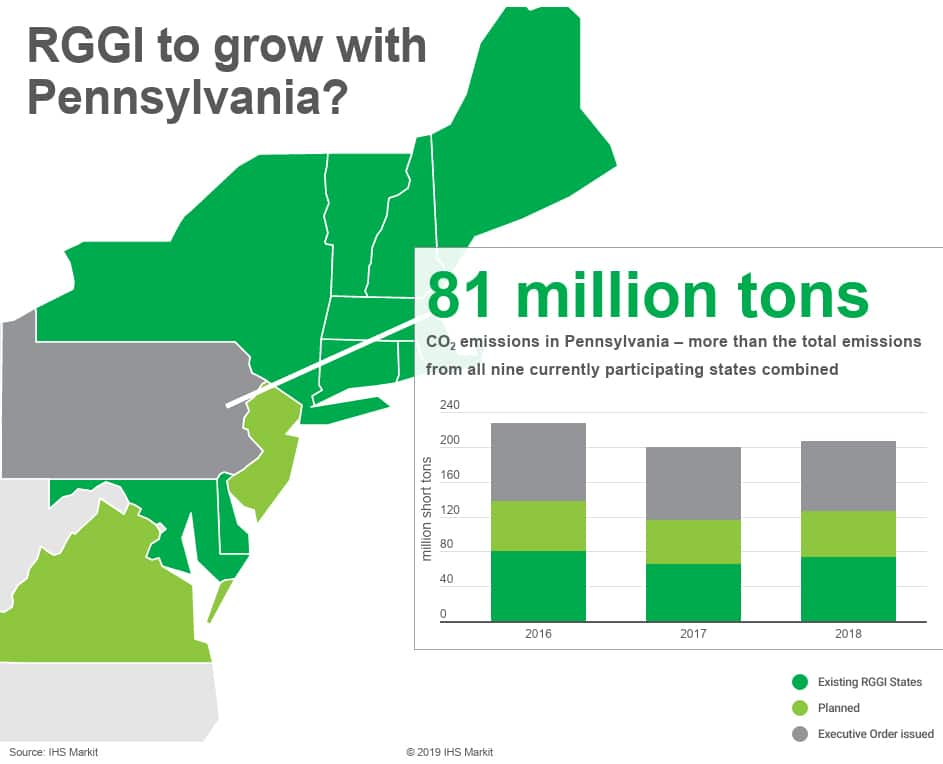
States in voluntary GHG reduction program
From an Article by Robert Zullo, Virginia Mercury, July 16, 2021
Richmond’s circuit court has a rejected a challenge filed by a group representing Virginia manufacturers who sought to thwart the state’s entry into a regional carbon-trading network.
The Virginia Manufacturers Association alleged the state Department of Environmental Quality had violated the state Administrative Process Act when it revised regulations that brought Virginia into the Regional Greenhouse Gas Initiative (RGGI), which caps carbon emissions from power plants, arguing that it created “an illegal carbon tax on ratepayers.”
“The VA-DEQ did what the General Assembly required it to do. Therefore, the court finds that the VA-DEQ did not violate the VAPA in issuing the amended regulation,” wrote Circuit Court Judge Beverly Snukals.
The Department of Environmental Quality came up with rules for participation in a carbon market in 2018. But due to a state requirement that the General Assembly must approve any exchange of state monies, the initial regulation devised a complicated system for distributing allowances that emitters would then have to sell into the broader market. Although the State Air Pollution Control Board approved that regulation in 2019, Republicans blocked Virginia from taking any further action through budget language.
“Virginia’s CO2 Budget Trading Program is a key component in reducing our carbon pollution while also investing in mitigation and resiliency projects that protect communities from the negative effects of climate change, especially sea-level rise,” said Virginia Attorney General Mark Herring, whose office handled the case. “I’m really proud we were able to protect this central piece of our climate strategy, and I appreciate all the work our environmental attorneys did in this complex and important case.”
After Democrats took control of both houses of the General Assembly in 2020, they pushed through the Clean Energy and Community Flood Preparedness Act, which authorized DEQ’s director “to establish, implement, and manage an auction program to sell allowances into a market-based trading program consistent with the RGGI program and this article.”
“Virginia’s participation in the Regional Greenhouse Gas Initiative is already working to drive down carbon dioxide emissions in the commonwealth in tens of millions of dollars to help low-income families reduce electricity bills and communities combat flooding,” said Nate Benforado, an attorney with the Southern Environmental Law Center, in a statement. “The Virginia Manufacturers Association’s last-ditch effort to upend this program not only would have subverted the will of the General Assembly, but also would have hurt millions of people across Virginia who stand to benefit from cleaner air to breathe and programs to deal with climate change.”
In a statement, Brett Vassey, president and CEO of the Virginia Manufacturers Association, said the group was disappointed by the decision.
“For years electricity consumer have been told that RGGI is not a tax and would only cost few dollars per month – not true,” Vassey said. “The public has also been outraged by the lack of transparency and participation in the regulatory process – again it has been clearly demonstrated in this case. Our goal all along was that this suit would ensure that the Virginia General Assembly and all state agencies would return to transparent taxation and ensure that all regulations follow the Virginia Administrative Process Act. Today, electricity consumers were denied both.”
###
See also: Regional Greenhouse Gas Initiative (RGGI) | Center for Climate and Energy Solutions, July 2021
The Regional Greenhouse Gas Initiative (RGGI) is the first mandatory cap-and-trade program in the United States to limit carbon dioxide from the power sector. Eleven states currently participate in RGGI: Connecticut, Delaware, Maine, Maryland, Massachusetts, New Hampshire, New Jersey (withdrew in 2012, rejoined in 2020), New York, Rhode Island, Vermont, and Virginia. In 2019, Pennsylvania Gov. Tom Wolf directed the state’s Department of Environmental Protection to develop regulations for the state to join RGGI, and the state is expected to join in 2022.
RGGI requires fossil fuel power plants with capacity greater than 25 megawatts to obtain an allowance for each ton of carbon dioxide they emit annually. Power plants within the region may comply by purchasing allowances from quarterly auctions, other generators within the region, or offset projects. Between 2009–2017, RGGI states have seen a net economic benefit of $4.7 billion from the cap-and-trade program.
